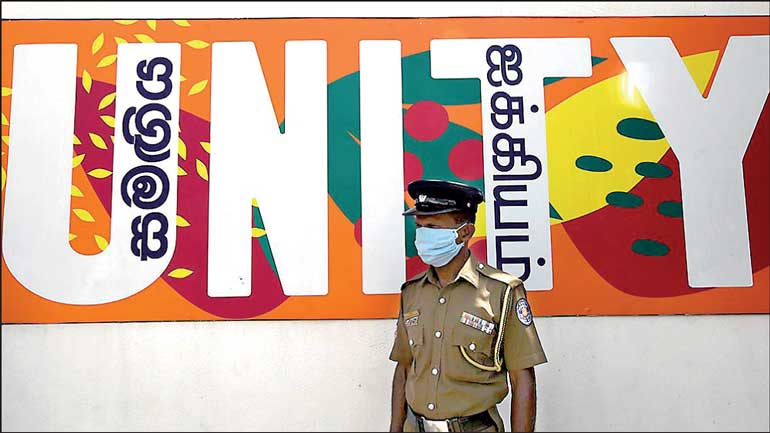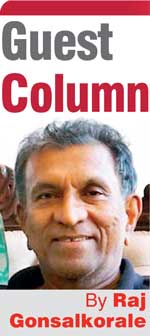Wednesday Mar 04, 2026
Wednesday Mar 04, 2026
Thursday, 19 August 2021 00:00 - - {{hitsCtrl.values.hits}}

The challenge for the Sinhala and Sinhala Buddhist community, the Tamil community, the Muslim community and other communities is not to take away what enriches them, but to respect and love each other and their differences and harness the individual energies of each community to create a collective energy that powers what one might call a Sri Lankan identity – Pic by Shehan Gunasekara
“Keep your thoughts positive because your thoughts become your words. Keep your words positive because your words become your behaviour. Keep your behaviour positive because your behaviour becomes your habits. Keep your habits positive because your habits become your values. Keep your values positive because your values become your destiny”
– Mahatma Gandhi
 Felice Leonardo Buscaglia, also known as «Dr. Love,» was an American author, motivational speaker, and a Professor in the Department of Special Education at the University of Southern California. One of his quotations resonates with the general approach of most human beings to worldly problems: “Don’t spend your precious time asking ‘Why isn’t the world a better place?’ It will only be time wasted. The question to ask is, ‘How can I make it better?’ To that there is an answer.”
Felice Leonardo Buscaglia, also known as «Dr. Love,» was an American author, motivational speaker, and a Professor in the Department of Special Education at the University of Southern California. One of his quotations resonates with the general approach of most human beings to worldly problems: “Don’t spend your precious time asking ‘Why isn’t the world a better place?’ It will only be time wasted. The question to ask is, ‘How can I make it better?’ To that there is an answer.”
This is probably where the wise words of Mahatma Gandhi come in and perhaps is the best answer that Buscaglia alluded to in the approach described by Mahatma Gandhi.
In a perfect world, and in Sri Lanka, one could have learnt lessons from history. Considering that a solution to the Tamil ethnic issue is still being sought and still is in the national as well as in international arena, it does not appear that lessons have been learnt. Very likely, the problem has not been understood in order to link it to history.
Religion
The fundamental teachings of all major religious leaders, the Buddha, Prophet Mohamed and Jesus Christ could have guided us to love, respect and help each other as equals and without discrimination. Instead, in the imperfect world, external ritualistic practices and edifices dot the landscape while internal spiritualistic mindfulness consistent with the original teachings have been subsumed by the external manifestations of what is the opposite of such teachings.
Religion perhaps plays the most significant influencing factor in the “nurture and nature” pathway to development of one’s individual values, and collectively to social values. In this context, a question can be asked legitimately whether religion and contemporary religious leaders have contributed towards development of values; whether they have been positive or negative, and whether they have been consistent or inconsistent with the teachings of the founders of the religions. There is also a question mark whether nature and nurture upbringing reflects what the founders of these religions taught or whether they are what is dictated to by subsequently established religions institutions.
It is noteworthy that institutionalisation of religions happened long after the departure of the founders, and that in their time, there were no institutions. Buddha preached to people by travelling from village to village all over what is known as India today. He slept in caves, under trees, ate what was offered to him by people.
In fact, he breathed his last under a tree. He counselled his Monks not to travel in the evenings seeking food, for their safety and security. Thus began the practice of not taking any food after a mid-day meal for practical reasons, and not, for any religious reason.
In today’s imperfect world, the Buddhist institutional heads do not travel anywhere on foot. Probably it is not practical to do that, but the evolution from walking to travelling in super luxury vehicles is perhaps incongruent with the life style they are supposed to lead as per the code of conduct for them contained in the Vinaya Pitakaya. In this same imperfect world, the Buddhist institution harbours a caste divide within its Nikaya system, both totally against the core human principles enunciated by Buddha.
Today’s religious institutional heads and members of these institutions, by and large, have not been able to look at some practices by giving logical thought and reasoning to why such practices were relevant at the time of the founders of the religions and perhaps not so today. It can be argued that some such practices that evolved over time and have been interpreted by many down the track as what the founders preached, without any logic being applied to such interpretations. Non-adherence to some of these interpreted practices have been at the root of radicalisation within some religions.
Sri Lanka
While it is a generalised comment, in contemporary Sri Lanka, a solution to the ethnic issue relating to Tamils has been interpreted as arising purely on account of debateable historical reasons by the broader Sinhala Buddhist community. Towards this end, either to debunk and disprove such interpretations, or to prove and establish “facts,” historically and archeologically, leaders of both communities have engaged virtually in a game of chess, without engaging in a discussion on how aspirations of both communities could be understood better.
Rather, discussions and debates have been about which community lived where, for how long, how many currently lives and where, who came to the island first, which language is older and richer, and similar debates which have underpinned the discussions pertaining to a solution. Arguments, disagreements, and eventually terrorism and war, have been about territory, geography, numeracy, superiority and not enough about aspirations, what they are, why they are important, and how they could be realised amicably.
An aspiration is mentioned as “a strong hope, dream, or goal. The idea of aspiration has a positive, upward connotation. We aspire to be or to become something that we perceive is better than what or where we currently are. There are many different types of aspirations, such as career, social, political, and personal”.
The Sinhala community, especially the Sinhala Buddhist community, considering their numerical majority status and portrayal of the country as a Sinhala Buddhist country, has not fully understood the aspirations of the Tamil community who have been an integral part of the country for hundreds of years. This has led to an ipso facto classification of communities as superior and inferior. This is partly as discussions have not been about aspirations of different communities but other extraneous topics. It is more than likely that the strong hope, dream or goal of the Tamil community for self-determination had arisen primarily because they were classed as second class citizens and not treated as equals to the Sinhala Buddhist community in independent Sri Lanka.
Lest it be not known, or forgotten, or conveniently ignored, the Tamil community, irrespective of whether they are ancient or recent arrivals in the island, are all from one of the oldest civilisations of the world, and while their genetic structures may have more similarities than dissimilarities with the Sinhala and Sinhala Buddhist community, their cultural, linguistic and social characteristics do have differences. It is these external manifestations of “nature and nurture” that creates many of these differences, and it is these that enriches, and also unfortunately diminishes who human beings are as social creatures.
Hawking’s message
Stephen Hawking reportedly had said, “One of the basic rules of the universe is that nothing is perfect. Perfection simply doesn’t exist. Without imperfection, neither you nor I would exist.” So, according to Hawking, human beings exist and evolve on account of differences, and not because of similarities. No doubt Hawking referred to the external manifestations and not fundamental characteristics like love, respect, compassion, consideration, accommodation, etc., which are internal and common to all.
Hawking’s message has a lot of value and relevance to the ethnic issue in Sri Lanka. It can be argued that it is rich culturally, linguistically and in the expression of social values because of the differences between communities. But, inequality and inequity diminishes this richness. The country could have been richer from a materialistic point of view, but poorer culturally and socially, if there were no differences. A purely materialistic society without the richness of culture would have been a sad place to live in.
Challenge for Sri Lanka
The challenge for the Sinhala and Sinhala Buddhist community, the Tamil community, the Muslim community and other communities is not to take away what enriches them, but to respect and love each other and their differences and harness the individual energies of each community to create a collective energy that powers what one might call a Sri Lankan identity. However, all communities within themselves will have to question whether their individual beliefs, rules, laws, cultural and religious habits are fair, equal to all within their communities and whether they are based on interpretations of religious history, rather than the logic behind the teachings of their religious leaders.
In recent times, sections of the Muslim community chose to embrace an Islamic ideology from Saudi Arabia which was at odds with the Islam hitherto practiced in Sri Lanka for hundreds of years, and which had not disturbed the societal and social equilibrium in the country. Islam extremism within the country led to the Easter Sunday bomb attack on Christian churches, disturbing that equilibrium.
Sri Lanka’s history, especially the post-independence history, has shown that communities, especially the Tamil community, suffered tremendous hardship on account of their ethnicity. Sinhala people in the North, and in many other parts of the country also suffered in the hands of the LTTE. The Muslim community also suffered both in the hands of the LTTE and the Sinhalese. Inability for communities to consider everyone as equals, respect each other, love each other as human beings, and distorting the meaning of differences, probably led to aspirations being linked to geographic territory and that being necessary in order to achieve aspirations through a process of self-determination within such a territory.
It is a difficult if not an impossible task to wind back history as history was created in the minds of people, by people, at different times, and it has permeated from generation to generation. In this context, one may have to recognise the contemporary dynamics rather than the historical dynamics and explore how geography may be used in a practical, constructive way and not in a destructive way, to progress and enhance communal harmony and amity within the collective that is called Sri Lanka.
The suggestion that the concept of a Union of Regions, originally proposed by late Dr. Neelan Tiruchelvam, and appropriately tailored to meet the basic aspirations of all communities, be used as a basis for addressing the question of self-determination for Tamils, was made by the writer in the context and spirit of addressing the hardships faced by the Tamil community in Sri Lanka since independence (please see https://island.lk/framework-for-a-new-sri-lanka-a-union-of-regions/).
While the country’s constitution in place now bars any discrimination and treats everyone as equals, it has to be noted that what is in the mind of a person cannot be legislated, and equality has to be willingly and consensually practised as a matter of course. The environment where this can happen matters a lot. The notion of self-determination has to be considered from this perspective and Tamils given the right to engage in such a determination for their security, safety, and opportunity, within a united Sri Lanka.